#küstrin
Text
Walking Kattes last way makes me feel so many emotions...
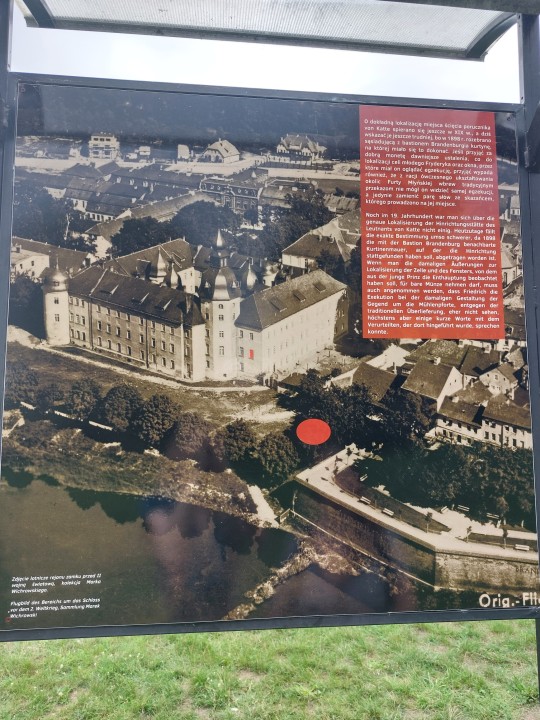


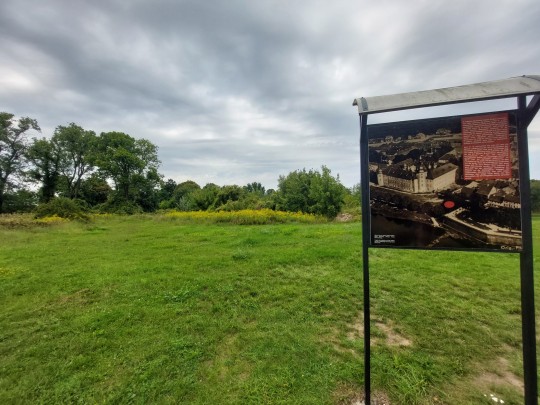


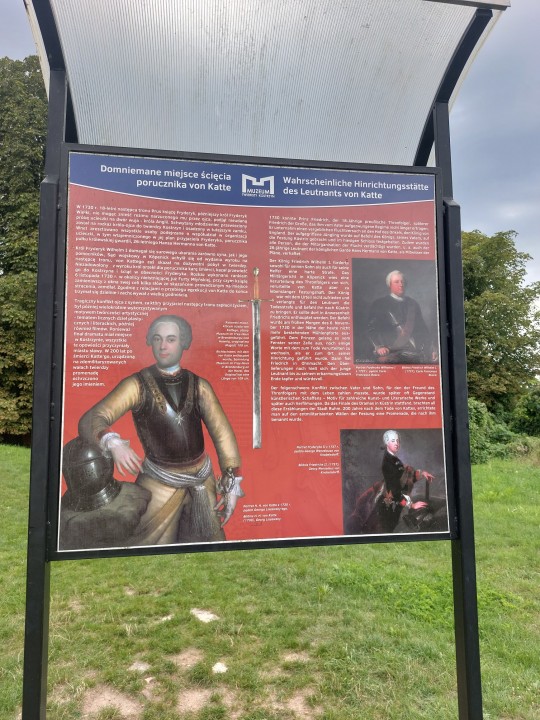
#küstrin#hans hermann von katte#friedrich wilhelm i#friedrich der große#frederick the great#katte#friedrich ii
20 notes
·
View notes
Text
Bahnverkehr + Regionalverkehr + S-Bahn: Für eine starke Schiene in Berlin-Brandenburg: Infrastruktur-Modernisierung 2024, aus DB
https://www.deutschebahn.com/de/presse/presse-regional/pr-berlin-de/aktuell/presseinformationen/Fuer-eine-starke-Schiene-in-Berlin-Brandenburg-Infrastruktur-Modernisierung-2024-12782800#
Fertigstellungen im Frühjahr und Sommer: #Modernisierter #Bahnhof #Berlin-Schöneweide, neues #Bahnhofsdach #Berlin-Ostkreuz, barrierefreier #Umsteigebahnhof #Potsdam-Pirschheide, Inbetriebnahme neue #Oderbrücke…
View On WordPress
#Alexanderplatz#Bahnhof#Bahnhofsdach#barrierefrei#Berlin#Bus#ETCS#Fahrbahn#Fahrplanwechsel#Fernverkehr#Finanzierungsbedarf#Friedrichstraße#Frohnau#Fugenübergänge#Generalsanierung#Hamburg#Hauptstadtregion#Instandhaltung#Instandsetzung#Köpenick#Küstrin#Lehnitz#Leistungsfähigkeit#Ludwigslust#Modernisierter#Modernisierung#Oderbrücke#Oranienburg#Potsdam#Regionalbahnhof
0 notes
Text

CUSTRIN / Küstrin - now KOSTRZYŃ in POLAND.
#Küstrin#kOSTRZYŃ#litho#litografia#Kostrzyn#pocztówka#post card#kartka#poland#polska#gruss aus#Polonaise#Polen#Pologne
0 notes
Text
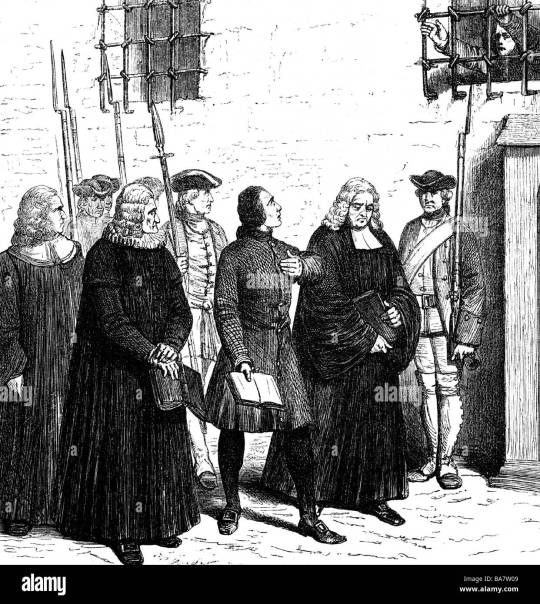
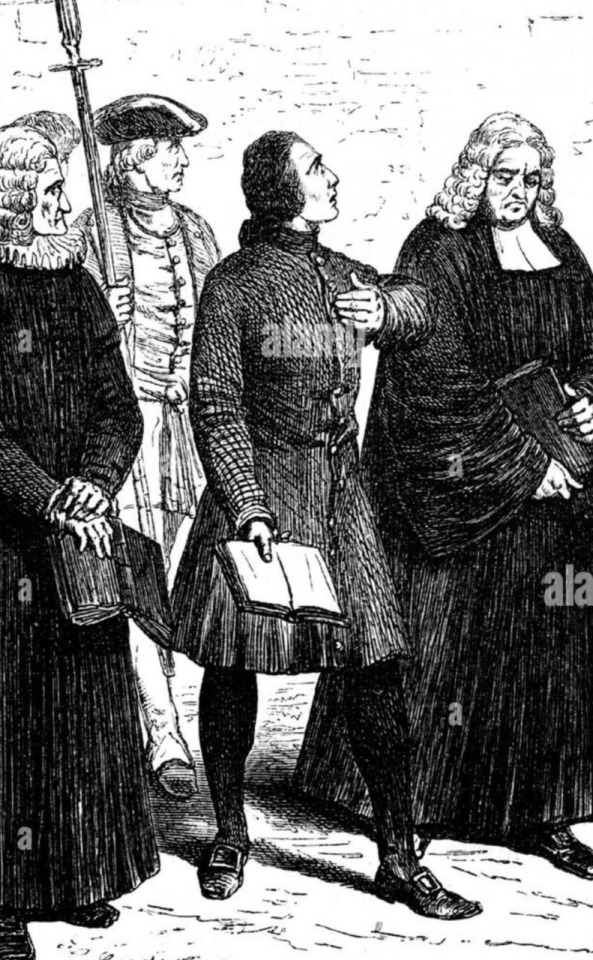
küstrin material and all but damn katte... slay
#my mans serving until literal death#hans hermann von katte#frederick the great#i'm so sorry#forgive me its 1:50am and i've been crying for hours
53 notes
·
View notes
Photo

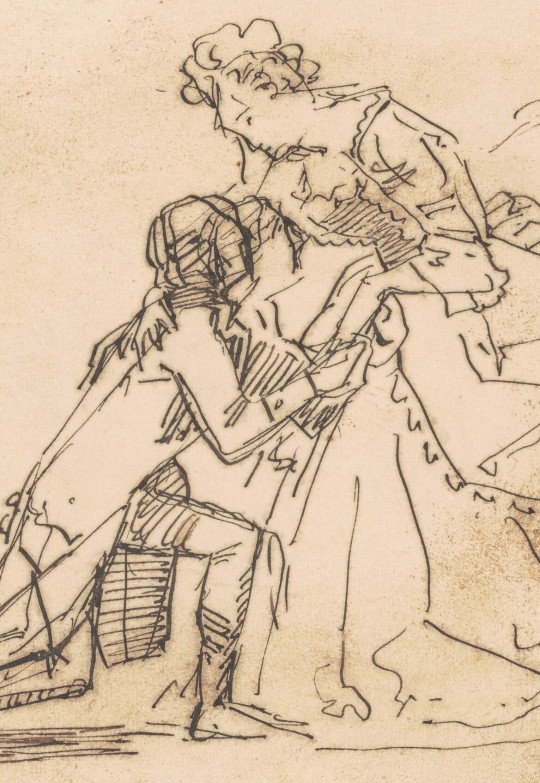
Emanuel Gottlieb Leutze (c. 1850s) Study for ‘The Return of King Friedrich II from Küstrin’
65 notes
·
View notes
Note
I am sorry to bother you, but I have obscure knowledge about the 1730 Katte Portrait that is RUINING MY LIFE and I have to share. I have no idea how much of this is already common knowledge, so I apologize for anything you already knew:
It was commissioned by Frederick the Great; he said that he had Katte painted “with great care”, and he said it was to depict “The soul of the man.” Basically, he was saying that the portrait is how HE sees Katte
It depicts Hans with the “Order of St. John” Medal, which had been taken from Katte by Friedrich Wilhelm I. But Fritz made sure it was included.
Katte’s uniform DOES NOT depict Friedrich Wilhelm’s initials; Fritz had deliberately made sure of this.
Fritz gifted the painting to Katte’s father as soon as he was King; at the in-person ceremony to make him a Count and Field Marshal. (On the anniversary of Hans Hermann’s arrest)
Hi there anon! :DD I'm so happy you came to me with this!
I'm unsure where you found the info, but I'll have to crush your dreams a little bit. You got a few things wrong/mixed up, which is completely okay!
Just to have a visual, the painting we're talking about is this one:

Painted by Georg Lisiewski in 1730. Now, Lisiewski did work for the Prussian court, but this painting was decidedly not commissioned by them (Fritz certainly didn't have the means to in 1730). The back of the original says:
"Dises Originalbild hat der seelige Freyherr von Katt mit grossen Fleis vertigen lassen von mich, George Liszewsky, Mahler in Berlin, anno 1730"
Now the first thing that shows is that Katte commissioned the image himself sometime before his arrest. It was then finished post-mortem for his family (they also had it enlarged, Katte originally commissioned a smaller painting). That's the reason for the "seelig" part: It does sound soul related at first glance, but selig is actually used to express something like "at peace" i.e. late or dead in this context. The phrasing "mit grossen Fleis"/"with great care" is standard painterspeak for "I do quality work" from what I can tell, you find it in Dürer's correspondence too.
As you've correctly stated and as we can see, the St John's cross was painted and the ususal monogram for the regent on the cuirass was not. Now the reason for that is somewhat unclear, actually. However, the anecdote about FW ripping the cross from Katte's neck appears to be untrue. The source is Pöllnitz, who claims to have heard it from Grumbkow. It seems unlikely due to Pöllnitz being Pöllnitz and also because Katte appears to have had the cross in his possession until his death. It then ended up with Lepel, the commander of Küstrin, via Major von Schack.
We can only speculate why Lisiewski did not include the monogram, but Fritz in all likelihood did not have anything to do with that. Kloosterhuis writes that perhaps he no longer saw the need to show Katte as the King's man after his passing and more as a man of God, signified by the cross. It is also possible that the monogram was overpainted later on, when the painting was enlarged. As a painter myself, it is also possible that Lisiewski just messed up tbh. There's a lot going on in that specific area of the chest (this is just as if not more speculative than Kloosterhuis's ideas, obvi).
Now, you were also right about Fritz gifting the Kattes a portrait and making them counts! It was not on the anniversary of Katte's arrest but ten days prior, closer to the 10th anniversary of his own arrest. The portrait (which, according to a later source, was "sent" to Hans Heinrich rather than given, without a note "as not to reopen an old wound") was not one of their son but one of himself, this one:
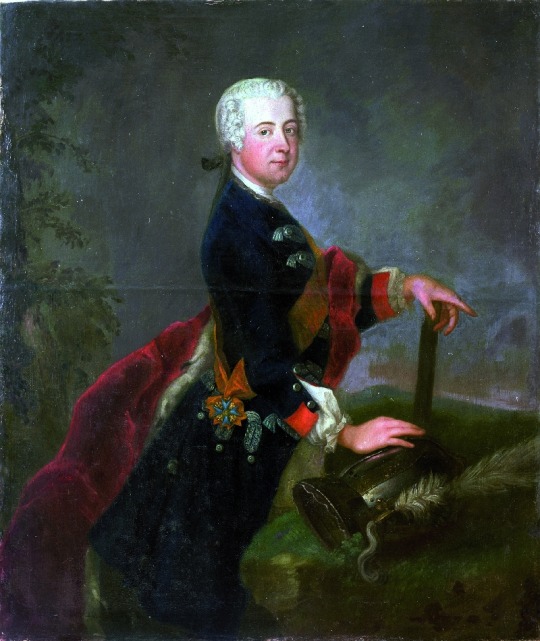
Painted by Knobelsdorff, around 1737.
The portraits were then possibly displayed together (possible reason for enlarging the portrait of Hans Hermann), which is a nice thought.
Also since the last time I've spoken about the yellow portrait, there has been a development! The painting is now on display and can be seen in Schloss Wolfshagen. The Fritz portrait is also owned by the Gans zu Putlitz, so he may be there too? I'll be able to tell you more about it in May.
#greetings from my mom who thought that if i wasn't working on my paper i had to be texting people#hans hermann von katte#frederick the great
18 notes
·
View notes
Text
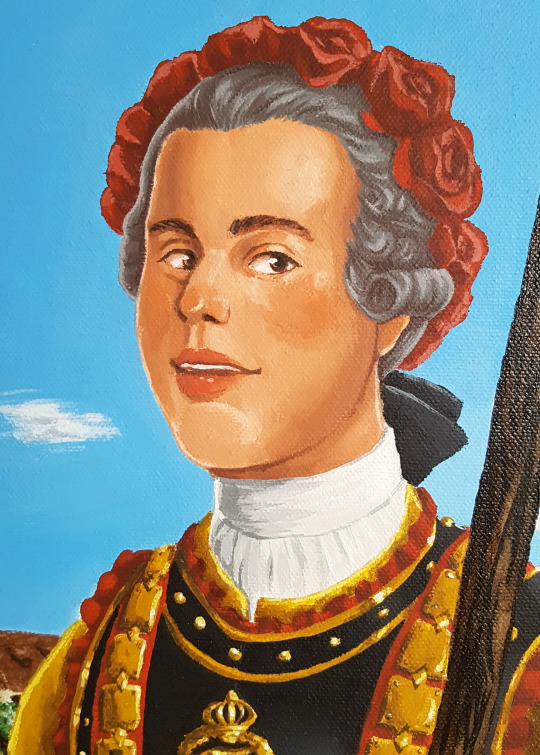
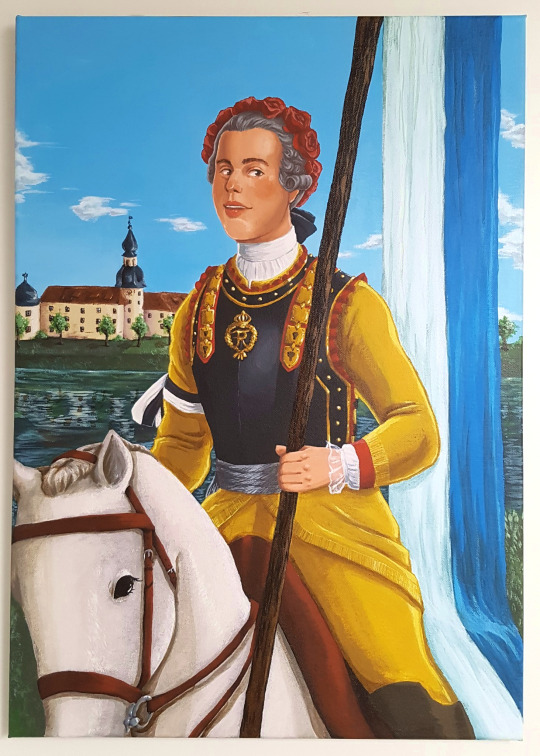
„Ingersleben will Soldat werden; Katt incliniret eher zur
Poeterey und Träumerey“ - Katte's teachers in Glaucha, 1719
Y'all know I'm a slut for portraits, especially ones with poetry and dreamery.
Enter my long-time project from the crappy art class I took! I learned a lot, but only because I taught myself :'D The teacher insisted that I was painting Jeanne d'Arc in front of a random French castle. I told him that I was not. He didn't get it. Anyway.
This is my most ambitious acrylic painting as of yet (and, with 50x70 centimeters one of the biggest) and while a lot of mistakes were made, I am overall happy with the outcome. Rambling about the painting process, vague intended symbolism and memery under the cut.
I started this thing back in early March. Originally, I wanted to show Katte as more of a traditional knight, representing parts of his family's coat of arms (a white cat with a mouse between its teeth on a light blue background). Then I noticed that, with a summery sky as a background, the painting would be SO blue and white it could be hanging in the Landtag of Bavaria. So the only parts of that idea that are left at this stage of the painting are the banner, the roses (the full version of the coat of arms includes red roses sprouting from the top of the helmet), and the ribbon around his arm as a knight's favour.
The ribbon is black and white as a nod to the coat of arms of the Hohenzollern. I was considering a few other colours (orange, for the sash of the Order of the Black Eagle; blue and white for the family; the colours of his mother's coat of arms; green, because Friedrich liked green; rainbow, because my mom said "It's Pride Month and he's gay, make it rainbow!"...) but the black and white seemed the most fitting. Although making it rainbow was tempting.
Another thing that connects Katte to Friedrich in this picture is the cipher on his cuirass that reads FR (instead of FWR, which would have been the correct cipher during Katte's time in the military). Funnily enough, I left out the mark of Katte's actual knighthood, the St John's cross, in favour of the mark of his loyalty to his Prince.
It's the other way around on the actual portrait that we have of Katte and people have been wondering if the lack of royal cipher on the cuirass may have something to do with the execution taking place before the painting was finished. I do believe that that's an interesting theory; after working on painting the damn thing myself I could also see the variation that there was just too damn much going on in this specific spot on the cuirass to paint it all :'D That's what happened to me, in any case.
The background is a rendition of the palace of Küstrin - just the palace, because ya girl wasn't gonna copy the whole city off of early 20th century postcards. Would have been more trouble than it was worth. I was originally considering showing the city wall of Tangermünde, which is the next bigger city from Katte's ancestral estate of Wust (and a wonderful place to spend a weekend!), but Küstrin felt more fitting. Overall, I feel like you can really see what I usually paint - people, usually no houses, and definitely no horses. But I like it. It's my boy. He has a cute nose and his cuirass is shiny.
As for memery: Er sieht halt einfach echt ein bisschen aus wie das Logo vom Rotbäckchen-Saft

57 notes
·
View notes
Text
Catt... have you been reading Voltaire?
idk why i wrote something this long
Im re(re)reading Voltaire memoirs and suddenly realised... damn, Catt’s probably been reading it before/while writing his own.
It’s not too surprising as I imagine almost everyone read the memoirs after it came out, but it never occured to me that Voltaire’s memoirs can actually serve as a source material for Catt.
The passages about Fritz’s 1730 escape just have too obvious similarities, in rhythm of some parts of the story, in details given, even in usage of specific words:
----
Voltaire: Le prince, lassé de toutes les attentions que son père avait pour lui, résolut un beau matin, en 1730, de s’enfuir, sans bien savoir encore s’il irait en Angleterre ou en France. L’économie paternelle ne le mettait pas à portée de voyager comme le fils d’un fermier général ou d’un marchand anglais. Il emprunta quelques centaines de ducats.
Catt: “...tout cela me fit prendre, il est vrai, en grand étourdi, le parti violent de quitter la maison paternelle; mais, ô diable, savais-je où je voulais aller? [...] J’empruntai quelques centaines de ducats, car, grâces à l'économie de mon père, je n'avais souvent pas le sou en poche.”
Voltaire: Le prince était depuis quelques semaines dans son château de Custrin, lorsqu’un vieil officier, suivi de quatre grenadiers, entra dans sa chambre, fondant en larmes. Frédéric ne douta pas qu’on ne vînt lui couper le cou. Mais l’officier, toujours pleurant, le fit prendre par les quatre grenadiers qui le placèrent à la fenêtre, et qui lui tinrent la tête, tandis qu’on coupait celle de son ami Kat sur un échafaud dressé immédiatement sous la croisée. Il tendit la main à Kat, et s’évanouit. Le père était présent à ce spectacle [...].
Catt: « ... un matin, un vieux officier entra chez moi, avec plusieurs grenadiers, tous fondant en larmes. ‹ Ah mon Prince, mon cher, mon pauvre Prince. › disait l'officier, en sanglotant, ‹ mon bon Prince. › Je crus certes qu'on allait me couper la tête. ‹ Eh bien parlez, dois-je mourir? je suis tout prêt que les barbares m’expédient, et vite. › — ‹ Non, mon cher Prince, non, vous ne mourrez pas, mais permettez que ces grenadiers vous conduisent à la fenêtre, et vous tiennent là. › « Ils me tinrent en effet la tête, pour que je visse ce qui allait se passer, Bon Dieu, quel spectacle terrible, mon cher, mon cher mon fidèle Katte, qu'on allait executer sous ma fenêtre, je voulus tendre la main à mon ami, on me la repoussait. ‹ Ah Katte. › m'écriai-je; je m'évanouis, et je trompai la barbarie de ceux qui me forçaient à voir ce cruel et ce barbare spectacle. »
----
The similarity is striking. This IMO can be explained as either: 1) Voltaire and Catt had the same source, be it Frederick himself, or contemporary newspapers & other publications, or, out of sheer chance, from some other person residing in Berlin. 2) Catt read it from Voltaire, who in turn heard from another person, which could be Wilhelmine as well as others.
Can it be that Frederick actually told the story to both of them?
In Voltaire’s case, he and Émilie had already known a vague version of the 1730 events before knowing Frederick personally. F then (as far as i recall) only mentioned in his letter that “he already experienced one shipwreck in his life” (not pointing out specific events), therefore he didn’t want Voltaire to come to Prussia while his father was still living. When F became king in 1740, V tried to ask whether his father had shown him any kind of affection and appreciation in his last moments, but F never answered. With nothing on paper, no answer from a previous ‘personal’ question, I’m not sure if Voltaire would be bold enough to ask about Katte and the Küstrin period in person, but well.. it’s not impossible. (I’ve not read their complete letters from 1743 to 1749 though so I might have missed stuff...)
In Catt’s case, his diaries do not record any coherent story about Fritz’s imprisonment. There’s only Fritz, in moments of desperation, bursted out some comments about how unhappy his whole life has been, that of course includes Küstrin. After the battle of Maxen (late November 1759, a whole Prussian corps was captured when he was confident that he had already won the control of the area), F all of a sudden started saying how, in Küstrin, his only support was theology books that he read as a kid, how he was fed everyday with a plate sent through his cell door. This last comment is incorporated into the large chunk at the beginning of the memoirs, which we quoted from. The other is written into the same time it actually happened (like 200 pages in). In his 1759 diaries, while Fritz was away, Catt had also recorded some anecdotes he heard from other people in the army, which he also put into that large chunk.
So, it’s probably not F himself. And if I can speculate, I think Fritz doesn’t really like to talk about this period, especially not on his own initiative. And, when Wilhelmine says that no one dared to talk to him about this, there’s some truth in it.
As for contemporary publications, which I don’t know about, there is certainly a possibility. But for them to take one single news-story or a pamphlet and write two texts that use similar kind of expressions and turn of phrases...?
Moving on - did Voltaire hear it from Wilhelmine? If she had told Voltaire in person, the story was certainly not like how she gives in her own memoirs. Wilhelmine indeed wrote a passage that conveys ‘F believes that he is to be executed’, but is described like this:
Le jour auparavant le général Lepel, gouverneur de la forteresse, et le président Municho conduisirent mon frère dans un appartement, qu’on lui avoit préparé exprès dans l’étage au dessous de celui où il avoit logé. [..] Les rideaux des fenêtres étoient baissés, ce qui l’empêcha de voir d’abord ce qui se passoit au dehors. [...] Alors le général, ayant levé les rideaux lui fit voir un échafaud tout couvert de noir de la hauteur de la fenêtre, qu’on avoit élargie et dont on avoit ôté les grilles; après quoi lui et Municho se retirèrent. Cette vision et l’altération de Municho firent croire à mon frère, qu’on alloit lui prononcer sa sentence de mort, et que ces apprêts se faisoient pour lui, ce qui lui causa une violente agitation.
Mr. de Municho et le général Lepel entrèrent dans sa chambre le matin, un moment avant que Katt parût, et tâchèrent de le préparer le mieux qu’ils purent à cette terrible scène. On dit que rien n’égala son désespoir.
* Wilhelmine’s version has been proven to be physically impossible to happen, since there was a short tower in front of the first-floor window at the time, and other accounts tell that Katte was escorted to a nearby battery.
----
Of course, no matter how & where he learned this, Voltaire must have retouched the story to make it effective in his own text. His version is deliberately cold, sometimes even told with a trace of black humor. While Catt, telling basically the same story, makes use of the first-person perspective to make the scene as sentimental as possible. This large chunk about Fritz’s childhood and 1730 makes me depressed everytime I read it );
* * *
Bonus - two more evidences that scream “Catt did incorporate Voltaire’s memoirs into his own”:
There is a rare and weird reference that appears in V as well as in dC.
V: ... il n’y avait aucun art qu’il ne cultivât, et il n’eût pas essuyé chez les Grecs la mortification qu’eut Épaminondas d’avouer qu’il ne savait pas la musique.
dC: « Vous voyez, mon cher, que chez les Grecs je n'aurais pas eu, comme l'eut Epaminondas, la mortification d'avouer que je ne savais pas la musique. »
This is taken from Plutarch’s The Life of Themistocles: “... he was forced to defend himself rather rudely, saying that tuning the lyre and handling the harp were no accomplishments of his, but rather taking in hand a city that was small and inglorious and making it glorious and great. “ [x] Epaminondas actually dances and plays the flute(!) pretty well, according to Cornelius Nepos.
I tried to look up if the wrong one they are saying is commonly referenced in the 18th-century, or if it’s a joke in Frederick’s circle, but nothing came up. I could have overlooked something though??
---
V and dC present the same argument when discussing Frederick’s character and motives.
V: Mais il était dans sa nature de faire toujours tout le contraire de ce qu’il disait et de ce qu’il écrivait, non par dissimulation, mais parce qu’il écrivait et parlait avec une espèce d’enthousiasme, et agissait ensuite avec une autre.
dC: ... parfois, on [F] parlait avec une espèce d'enthousiasme, et qu'on agissait ensuite avec un autre bien contraire au premier; j'avais déjà fait cette réflexion en comparant ce qu’il me faisait souvent l'honneur de me dire, et ses compositions qu'il me lisait: ces disparates étaient plutôt la suite de cet enthousiasme que d’un manque de franchise.
The contexts are a bit different. Voltaire is saying how Frederick wrote as Crown Prince that France is the biggest enemy for German princes, but now (1741) that shit is going down, he allies himself with the French.
Catt had just written a ‘conversation’ (more like a declaration) in which Fritz, for the first time in the memoirs, talks about how much he wants to abdicate - but now that AuWi is dead he can’t, because his nephew is still a kid. I guess the contradiction is supposed to lie in, how, he says he wants to abdicate, then he never did, not even when FW II’s 35 y/o and 1.9 meters tall. Catt never explained this last part though, so it’s a bit vague. maybe at the time it seemed clearer.
Later in the memoirs, F talks about how when this war is over, he wants to abdicate and go to the Netherlands, but Catt doesn’t believe him. F gets a little offended and asks: Are you doubting my ability to make a resolution? Catt says: I don’t, I just think that when that time comes, you will want to enjoy your glory, and keep the throne you fought for. It’s a more suitable or more natural place to effectively deliver this argument than the first passage IMO.
As someone who has observed Fritz for two decades, and eventually produced such a rich book, Catt couldn't just be blindly following Voltaire’s judgement. instead, he actually agreed with him - to an extent.
As for Voltaire - I still don’t completely understand where this comes from. The memoirs is constantly saying that Frederick is the ultimate seductress and you guys can’t blame me, an innocent man, for falling for the ultimate seductress. But what he conveys in this line is so ambiguous - is V actively struggling with what the fuck this king is about? Is he even making excuses for him? Or is “enthousiasme” used here because it’s actually better to simply trick others while not committing oneself into the relationship, and worse to genuinely love someone, but that this love is partial, it depends on who’s speaking and acting, the individual or the king?
23 notes
·
View notes
Text
Der Kronprinz singt
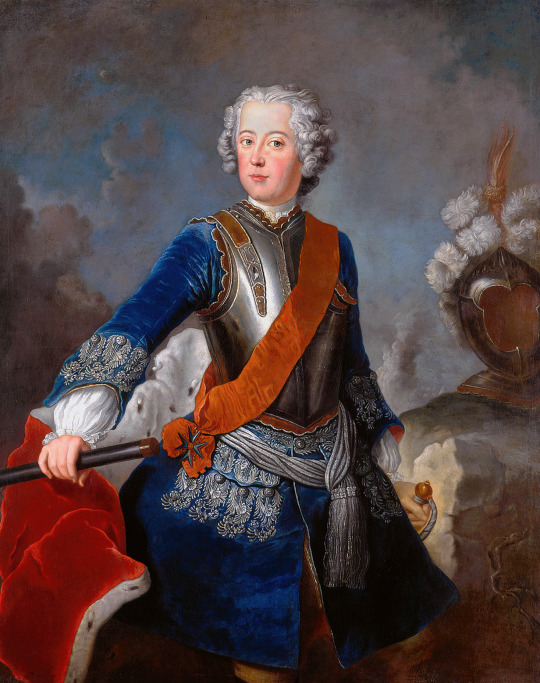
Friedrich der Große als Kronprinz, Antoine Pesne, 1736. Vormals Berliner Stadtschloss, heute: Huis Doorn, via Wikimedia Commons.
Auf einer nächtlichen Zugfahrt durch ein Land, in dem man Bisamratten im Freibad sieht und in dem es auch wieder Wölfe geben soll, entstand aus einer vergnügten Laune heraus im Gespräch mit einer gleichsam historisch interessierten Reisegefährtin die Idee, die allseits bekannte inoffizielle Hymne Brandenburgs einigermaßen historisch nach den Erlebnissen und persönlichen Empfindungen des berümtesten aller preußischen Könige als jungem Mann umzugestalten. Von Friedrich Wilhelm I. beim Tabaskollegium zugequalmt zu werden kann ja wohl kaum schlimmer sein, als nach Zugausfall auf unbestimmte Zeit in einer brandenburgischen Kleinstadt festzuhängen... oder?
Jedenfalls exisitiert jetzt eine nagelneue Textfassung von Rainald Grebes Brandenburg aus der Sicht des 18-jährigen Fritz.
Zum darüber lachen, den Kopf schütteln und meinetwegen auch unter der Dusche singen:
Es gibt Länder, wo was los ist
Es gibt Länder, wo richtig was los ist, und es gibt
Brandenburg, Brandenburg
In Brandenburg, in Brandenburg
Gabs wieder einmal einen Fahnenfluchtversuch
Was soll man auch machen mit 17, 18 in Brandenburg?
Es sind nicht alle Lange Kerls, doch mangelts Vattern an Ideen
Ich muss von diesem Wüstling endlich weggehen
Aus Brandenburg
Da steht der König auf dem Hügel und findet keinen zum Verprügeln
In Brandenburg, Brandenburg
Ich fühl mich heut‘ so leer, ich fühl mich Brandenburg
In England wär‘ ich einer von 6 Millionen
In Brandenburg muss ich bei meinem Vater wohnen
Brandenburg
In Berlin sind der Bach und der G. F. Händel
In Wusterhausen raucht Vattern in sei‘m Tabak-Tempel
Brandenburg
Küstrin, oh ich hasse Küstrin
Oh ich hasse Küstrin
Da wollt‘ ich nie hin
Und Katte wollte das auch
In Brandenburg, in Brandenburg
Gabs wieder einmal einen Fahnenfluchtversuch
Was soll man auch machen mit 17, 18 in Brandenburg?
Es ist nicht alles ganz schlecht, es gibt Keith und Wilhelmine
Doch glaubt Vattern dass sich das mit Katte nicht gezieme
In Brandenburg
Wenn man Friedrich Wilhelm auf Treibjagd sieht, dann ist man im Naturschutzgebiet
Mark Brandenburg, Brandenburg
Ich fühl mich heut so ausgebrandenburgt
In England kann man so viel erleben
In Brandenburg tut’s nicht mal Kartoffeln geben
Brandenburg
Aus dem Stadtschloss würde ich am liebsten verschwinden
In Wusterhausen kann Vattern den Malkasten nicht finden
Brandenburg
Küstrin, oh ich hasse Küstrin
Oh ich hasse Küstrin
Da wollt‘ ich nie hin
Küstrin, oh ich hasse Küstrin
Oh ich hasse Küstrin
Da wollt‘ ich nie hin
Und Katte wollte das auch
Lassen Sie mich durch, Prinz-Sein ist absurd, ich muss weg aus Brandenburg
Nimm dir Essen mit, wir brechen aus aus Brandenburg
Wenn man nach England will muss man raus aus Brandenburg
#utter nonsense#one of the few german posts you'll see from me#friedrich ii#friedrich der große#fritz#katte#hans hermann von katte#18 century#german history#history#music#song#brandenburg#rainald grebe#deutschland#germany#history humour#friedrich wilhelm i#soldatenkönig
7 notes
·
View notes
Photo

Adonisröschen-Radtour 2023: Wegen Bauarbeiten der Bahn diesmal auf etwas anderer Strecke von Seelow-Gusow zunächst auf dem Tour-Brandenburg-Radweg über die Mallnower Oderhänge und Podelzig, Reitwein nach Küstrin-Kietz, wo wir wieder mit der Regionalbahn zurück fuhren. Alles Asphalt außer der Strecke Podelzig-Reitwein: dort ruinierten Waldmaschinen den ungedeckten Weg. Ging aber auch, eben mehr Training. Nach den Adonisröschen bei Mallnow musste man etwas suchen, aber einige kleine Exemplare blühten schon fleißig. Insgesamt sehr schöne Tour, ordentlich gelüftet. Pro-Tipp: Immer ans Picknick denken, außer der Dönerbude in Seelow gab es nix zu essen. (hier: Mallnow, Brandenburg, Germany) https://www.instagram.com/p/CqTxUcoKwNK/?igshid=NGJjMDIxMWI=
0 notes
Text
Fritz wasn't the only one who saw his friend dying in Küstrin. Many comrades from the Gens d'Armes, inclusive Joachim von Holtzendorff, saw a friend dying. Joachim and Hans were friends since their time together in Glaucha (Halle) ...
#Can't stop thinking about the fact that Joachim was there and lost a friend from his youth#hans hermann von katte#joachim friedrich von holtzendorff#friedrich der große#Frederick II#Friedrich Ii#frederick the great#fratte#küstrin
6 notes
·
View notes
Text
Bahnverkehr: Nicht nur für Pendler: Ostbahn soll Rollbahn für Militärzüge werden, Berlin, Brandenburg und der Bund wollen den Ausbau des Bahnnetzes beschleunigen., aus Berliner Zeitung
Bahnverkehr: Nicht nur für Pendler: Ostbahn soll Rollbahn für Militärzüge werden, Berlin, Brandenburg und der Bund wollen den Ausbau des Bahnnetzes beschleunigen., aus Berliner Zeitung
https://www.berliner-zeitung.de/mensch-metropole/bahnnetz-nicht-nur-fuer-pendler-polen-wuenscht-sich-ostbahn-als-trasse-fuer-militaerzuege-li.232894
Neue Routen, mehr Verbindungen, kürzere Fahrzeiten. Um das #Schienennetz der Region für die Zukunft fit zu machen, soll in den nächsten zehn Jahren eine zweistellige Milliardensumme investiert werden. Dieses Ziel gaben Berlins Regierende…
View On WordPress
#Danzig#i2030#Königsberg#Küstrin#Ostbahn#Ostpreußen#Personenverkehr#Polen#Regionalbahnen#Schienennetz#schnurgerade#Strausberg#überregionale
0 notes
Photo

#zeitgeschichte: ruinen am #fort in #gorgast im #oderbruch in #brandenburg nahe #seelow #küstrin #küstrinervorland #brandenburger #brandenburgerland #brandenburgliebe #brandenburgistschön #landschaft #markbrandenburg #frankfurtoder #natur #landschaftsfotografie #urbex #lostplaces #lost #urbanexplorers #militaryhistory #combathistory #militaria #militar #battlefield #battle #warhistory #bunker https://www.instagram.com/p/BvYvSk9Fku5/?igshid=101ucsg3gjnk3
#zeitgeschichte#fort#gorgast#oderbruch#brandenburg#seelow#küstrin#küstrinervorland#brandenburger#brandenburgerland#brandenburgliebe#brandenburgistschön#landschaft#markbrandenburg#frankfurtoder#natur#landschaftsfotografie#urbex#lostplaces#lost#urbanexplorers#militaryhistory#combathistory#militaria#militar#battlefield#battle#warhistory#bunker
2 notes
·
View notes
Text

Hinter dem Deich
Alter Hof hinter dem Oderdeich bei Bleyen-Genschmar.
#Deich#Dike#Oder-Deich#Hof#courtyard#Küstrin-Kietz#Oderland#old farmhouse#east germany#Bleyen#Genschmar#Ostbrandenburg
2 notes
·
View notes
Photo
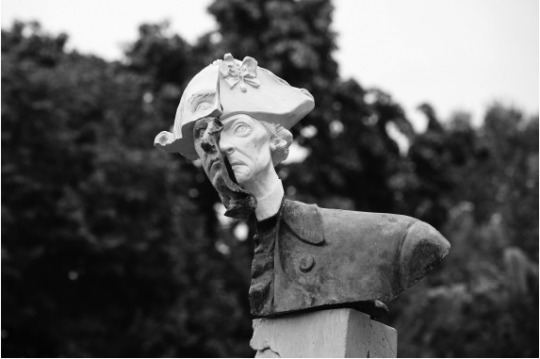

Memento Kostrzyn - art exhibition. July - September 2012 ( x , x )
Eleven international artists create site-specific artworks in the ruined, former fortress of Küstrin (today Kostrzyn nad Odrą).
37 notes
·
View notes
Note
I demand to see the Katte board on your shelf :D
Sure :'D

It ain't much, but it's mine. Just moved them from the board, actually, that one was facing a window and I don't want these to get damaged by the light.
From left to right there is:
An entirely unrelated glass dome from IKEA with an old silver cup I got from my grandma and two Friech related coins, one D-Mark, one Euro (the dome is the most expensive part of this setup)
Burte's terrible, hilarious Katte play (funny music)
"King in Prussia", the one where nobody understands his connection to the Crown Prince 🥺
"Das Richtschwert traf den falschen Hals", aka "I love you so much, my Prince. Jk."
Zeithain. Oh Zeithain.
Actual acclaimed German author Theodor Fontane's "Wanderungen durch die Mark Brandenburg - Havelland", featuring his fictional one shot about baby Katte spending quality time with his dad. I want to get a copy of Oderland eventually (for the Küstrin chapter), preferably also this pretty edition (which only cost me a euro more than the ugly modern one)
Ahnert's "Friedrich und Katte", the one where Katte has A Terrible Beard
A short amateur biography about Katte's father that I got in Wust. Hans Heinrich is quite the personality and I'd love to find out more about him too.
A collection of letters by European monarchs concerning the trial of 1730
A brochure I got in Wust that includes info about the church and the Kattes ("Hans Hermann's first ever letter was to his Engelsschwesterken", I NEED THAT SOURCE, also look at that k, we can see how he pronounced stuff!! 🥺) as well as some letters
Hinrichs' "Kronprinzenprozess", primary sources printed in a particularly exhausting to read Fraktur
Kloosterhuis' "Katte. Ordre und Kriegsartikel", second edition with added list of Ingersleben's 50 teacups
"Schädel-Schicksale" which includes some details about Katte's (?) remains in Wust
"Kriegsgericht in Köpenick", another one of Kloosterhuis', wonderful exhibition catalogue that left me with many new questions (he built a cabinet???)
And a collection of the letters between FWI and Müller the priest that I also got from the nice people in Wust.
Oh. And a bust of Frederick William III. My friend 3d printed it as a surprise for my birthday; Friech wasn't available as a 3d model :'D
I bought all of these except Ordre und Kriegsartikel and the brochures used for a few bucks ^^ Richtschwert cost me a whopping 35 cents with two euros shipping :'D
There are a few more things that I'd like to add. Like "Sorrows of Frederick" (fridged wife Katte, my beloved), but the only copies I can find are in the US and only available if I pay by credit card - which I don't have :(
16 notes
·
View notes